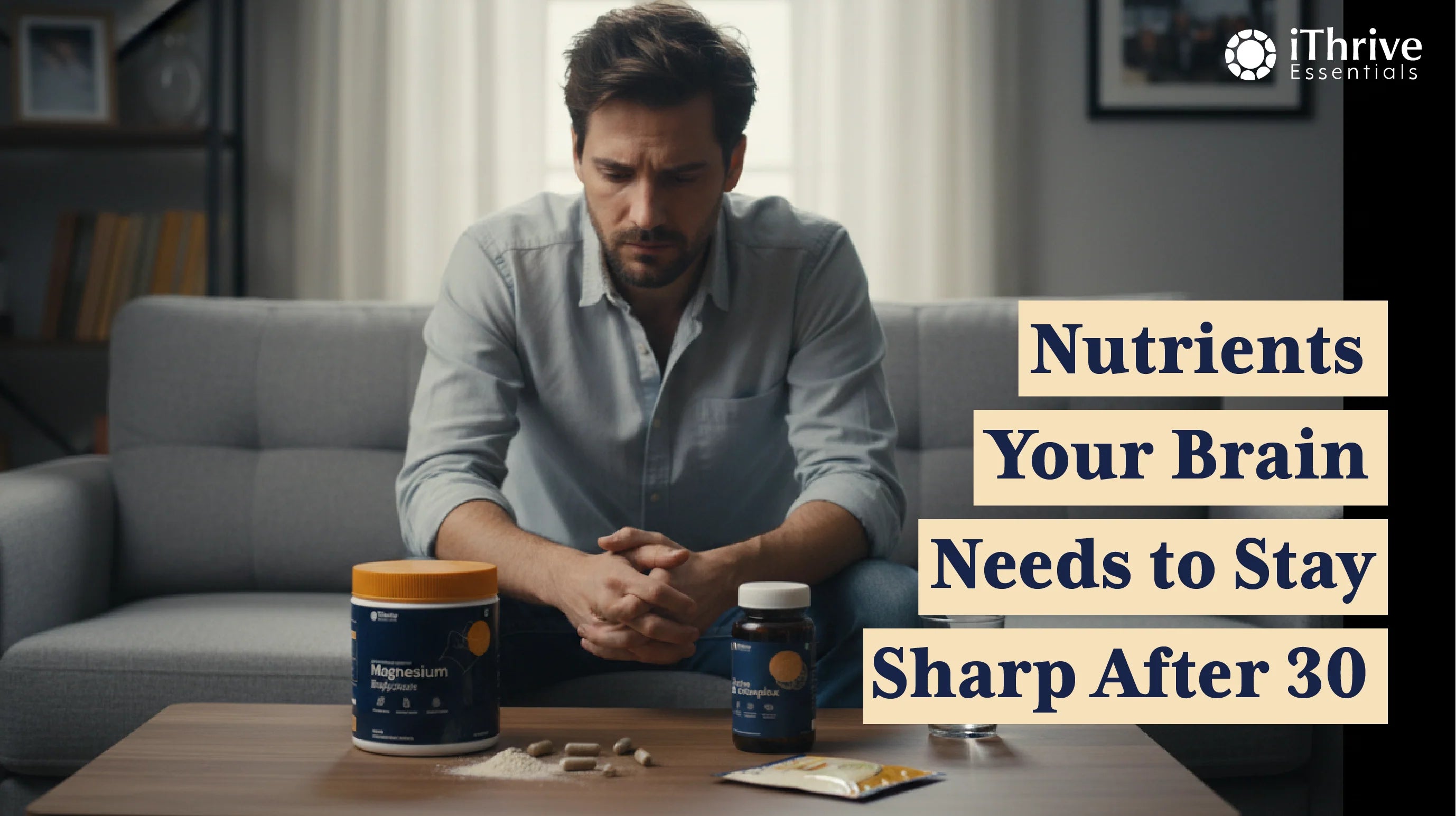Article: 5 Nutrients Every Man Needs for Reproductive Wellness

5 Nutrients Every Man Needs for Reproductive Wellness
Men’s reproductive health is declining faster than ever, and nutrients play a major role in this shift. Research shows that men’s sperm counts have dropped by more than 50% in the last few decades, and lifestyle stress, poor diet, and nutrient deficiencies are some of the biggest reasons behind it.
Low testosterone, poor sperm quality, low libido, fatigue, and even mood issues are becoming common in men as young as 25-35. What’s even more surprising? Almost 7 out of 10 men are deficient in key nutrients that directly support hormones and fertility.
This blog will provide insights on the five essential nutrients every man needs for healthy testosterone levels, better sperm quality, improved energy, and overall reproductive wellness.
Why Nutrients Matter for Men’s Reproductive Health
Your reproductive health depends heavily on what you feed your body. Sperm production, testosterone levels, libido, energy, and even mood are all influenced by the nutrients you get every day.
For example, minerals like zinc and magnesium help your body make testosterone. Omega-3 fats support healthy sperm structure. Vitamins like D3 help regulate hormones. Antioxidants like CoQ10 protect sperm from damage. When these nutrients are missing, your system simply cannot perform the way it should.
That’s why nutrient deficiencies don’t just show up as “health problems.”
They show up as:
- lower sperm count
- weak sperm
- reduced testosterone
- low libido
- fatigue and low energy
- increased stress and mood swings
Modern eating habits like fast food, processed meals, low-protein diets, and high sugar intake push men into nutrient deficiencies without them even realizing it. Pair that with high stress, lack of sleep, alcohol, and long working hours, and it becomes a perfect storm that affects fertility and hormonal balance.
The 5 Key Nutrients Every Man Needs
1. Zinc
Zinc plays a central role in a man’s reproductive system because it directly supports testosterone production. The Leydig cells in the testes that are responsible for making testosterone need zinc to function properly. Without enough zinc, testosterone levels drop, libido decreases, and overall performance suffers.
Zinc is also essential for spermatogenesis, the entire process of sperm formation. It helps in DNA synthesis, cell division, and building a strong sperm structure.
Another major role of zinc is its antioxidant action. Sperm cells are extremely sensitive to oxidative stress from poor diet, alcohol, smoking, and environmental toxins. Zinc protects them from this damage, helping maintain healthy sperm count, shape, and motility.
It even supports the enzyme that converts testosterone into its more active form (DHT), which is crucial for sexual health and vitality. In short, zinc fuels both hormone production and sperm health at the deepest level.
Where to get it:
Pumpkin seeds, eggs, meat and seafood are good food sources of zinc. But veg and non-veg sources aren’t equal.
Animal foods give zinc your body absorbs easily. Vegetarian foods like seeds and legumes contain phytates (anti-nutrients) that block zinc absorption, making them less reliable.
But many men still fall short, especially those who don’t eat enough protein, have gut issues, or follow restrictive diets. In such cases, supplementing can help maintain healthy levels.
You can also consider iThrive Essentials Zinc Defense, which provides a high-quality, easily absorbed form of zinc to support testosterone, immunity, and overall reproductive health.
Are you deficient in zinc? Lets read more to know the reality: Click here
Emerging research shows zinc deficiency plays a major role in male infertility. Dive deeper into the science: Read our blog to know more.
2. Vitamin D3
Vitamin D3 acts more like a hormone than a vitamin, and its receptors are found in the testes, prostate, and even the sperm cells themselves. This shows how closely Vitamin D is linked to male fertility.
One of its most important roles is supporting testosterone production. Studies consistently show that men with higher Vitamin D levels naturally have higher testosterone.
Vitamin D3 also plays a key role in sperm motility that is the ability of sperm to swim forward. It does this by regulating calcium channels in sperm, which are essential for proper movement and fertilization ability.
When Vitamin D levels are low, energy, mood, immunity, and libido often drop as well. In today’s indoor lifestyle, most men don’t get enough sunlight, making Vitamin D deficiency one of the hidden reasons behind hormonal imbalance and reproductive issues.
Where to get it:
You can get Vitamin D3 naturally through sunlight (10-20 minutes daily), along with foods like egg yolks and fatty fish.
However, most men still remain deficient because of indoor lifestyles, low sun exposure, and poor dietary intake.
Want to know if you are Vitamin D deficient? Take this quiz - Click here
If your levels are low, a Vitamin D3 + K2 supplement is one of the safest and most effective ways to restore balance. You can consider iThrive Essentials Vitamin D3 K2, which combines D3 for hormone support and K2 for better absorption and bone health.
To know more about why your body needs Vitamin D3+K2: Read our blog
3. Omega-3 Fatty Acids
Omega-3 fatty acids, especially DHA, are crucial for the structure and strength of sperm cells. DHA makes up a major part of the sperm membrane, giving sperm the flexibility and speed they need to swim efficiently.
Without enough omega-3, sperm often become weak, poorly formed, or slow-moving.
These healthy fats also improve blood flow to the testes by reducing inflammation and supporting vascular health. Better blood flow means better delivery of nutrients and oxygen to reproductive organs.
Omega-3s also support testosterone production because your body needs healthy fats to make steroid hormones. They protect sperm DNA from oxidative damage and improve mitochondrial function, allowing sperm to reach the egg with more strength and stability.
Where to get it:
Omega-3s are found in fatty fish (like salmon and sardines), walnuts, chia seeds, and flax seeds. But many men still don’t get enough because they don’t eat fish regularly or consume too many processed oils, which create an imbalance.
If your diet is low in omega-3s, supplementation helps fill the gap. You can consider iThrive Essentials Marine Omega-3 Complex, which combines krill oil and fish oil for better absorption and a balanced EPA-DHA profile that supports sperm health, hormones, and inflammation control.
To know more about how to choose the best omega-3 supplement: Click here
4. CoQ10
CoQ10 is one of the most powerful nutrients for sperm energy. Sperm cells contain a high number of mitochondria, and CoQ10 is essential for helping these mitochondria produce ATP. When CoQ10 levels are low, sperm may exist, but they lack the energy to swim effectively toward the egg.
CoQ10 also works as a strong antioxidant, protecting reproductive cells from oxidative damage caused by stress, poor diet, pollution, smoking, and even aging.
It has been shown to significantly improve sperm count, motility, and morphology (shape). By supporting cellular energy and reducing inflammation in the testes, CoQ10 helps build healthier, stronger sperm while also improving overall vitality and heart health.
Where to get it:
CoQ10 is naturally found in organ meats, fish, broccoli, and peanuts. However, the amount in food is usually too low to significantly support sperm health, especially for men dealing with stress, pollution exposure, or aging. In such cases, a supplement becomes more effective.
iThrive Essentials CoQ10 provides a high-absorption form that supports cellular energy, improves sperm motility, and protects testicular health.
5. Magnesium
Magnesium supports more than 300 processes in the body, but for men, its impact on reproductive health is especially important. It plays a key role in testosterone production and helps regulate the body's stress response. When stress is high, cortisol rises and testosterone drops. Magnesium helps break this cycle by calming the nervous system and balancing hormones.
It also improves sleep quality, which is crucial because most testosterone is produced at night. Magnesium enhances insulin sensitivity, which indirectly supports hormone balance and sperm quality.
It reduces inflammation and oxidative stress. By improving muscle relaxation and blood flow, magnesium also supports better sexual performance and libido. Essentially, magnesium helps men maintain stable hormones, better energy, deeper sleep, and a healthier reproductive system.
Where to get it:
You can get magnesium from leafy greens, whole grains, and dark chocolate. But stress, caffeine, alcohol, and poor sleep quickly drain magnesium levels, making deficiency very common in men today.
A good magnesium supplement can help restore balance, improve sleep, and support hormone health. iThrive Essentials Magnesium Bisglycinate is a gentle, highly absorbable form that supports better recovery, deeper sleep, and improved reproductive wellness.
Why your body needs magnesium: Here are 11 benefits of magnesium
Signs You May Be Deficient in These Nutrients

Most men don’t realize they are deficient until symptoms show up. The body gives very clear signals when it’s not getting enough of these key reproductive nutrients. Here are the most common signs to watch out for:
1. Low Libido and Reduced Sexual Performance
A drop in interest, lower stamina, or weaker erections can be linked to low zinc, magnesium, omega-3, or Vitamin D3 levels.
2. Fatigue and Low Energy Throughout the Day
When nutrients like CoQ10 and magnesium are low, your cells struggle to produce energy leading to constant tiredness.
3. Mood Swings, Irritability, or Low Motivation
Vitamin D3, omega-3, and magnesium directly influence mood and brain function, so deficiencies can lead to irritability, anxiety, or lack of focus.
4. Poor Sperm Quality
Low sperm count, slow-moving sperm, or abnormal sperm shape can all be linked to low zinc, omega-3, or CoQ10.
5. Frequent Illness or Weak Immunity
Low zinc and Vitamin D3 weaken immune function, making you fall sick more often or take longer to recover.
6. Poor Sleep or Restlessness at Night
Low magnesium can lead to trouble falling asleep, light sleep, or waking up tired.
7. Muscle Cramps or Slow Recovery After Workouts
Low magnesium and omega-3 affect muscle relaxation, recovery, and reduce overall strength.
8. Hair Fall or Weak Nails
Zinc deficiencies can show up in faster hair shedding, slow beard growth, or brittle nails.
9. Weight Gain or Higher Belly Fat
Low magnesium and Vitamin D3 affect metabolism and insulin sensitivity, making fat gain more likely.
Conclusion
By focusing on essential nutrients like Zinc, Vitamin D3 K2, Omega-3s, CoQ10, and Magnesium, you give your hormones, sperm health, and overall vitality exactly what they need to function properly. Small daily habits like better food choices, sunlight, sleep, and quality supplements can make a big difference.
Taking care of these basics is one of the simplest ways to strengthen your reproductive health naturally and feel better




Leave a comment
This site is protected by hCaptcha and the hCaptcha Privacy Policy and Terms of Service apply.